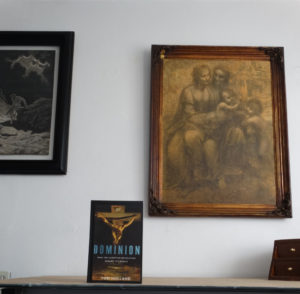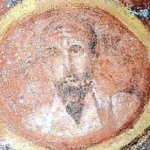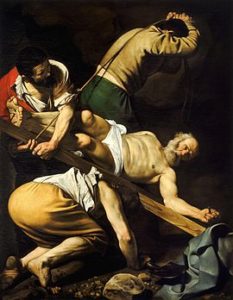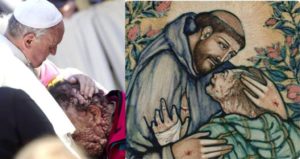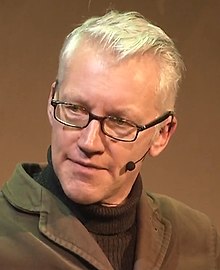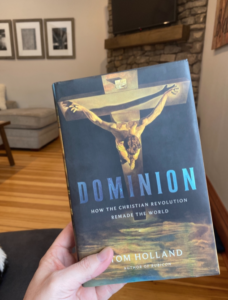Or:
How the Woke monster originated
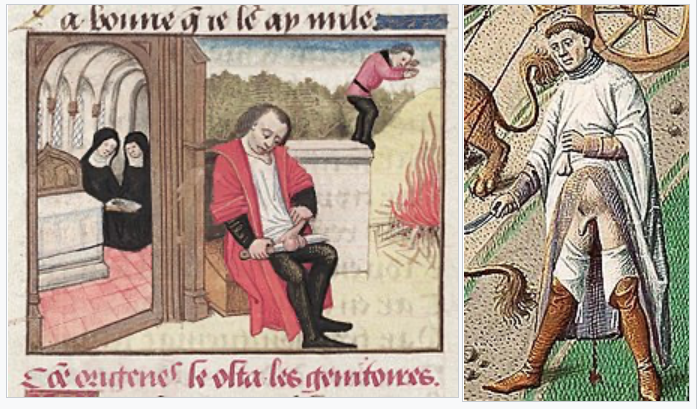 Eusebius claims in his Ecclesiastical History that, as a young man, Origen secretly paid a physician to surgically castrate him: a claim which affected Origen’s reputation for centuries, as demonstrated by these 15th-century depictions of Origen castrating himself.
Eusebius claims in his Ecclesiastical History that, as a young man, Origen secretly paid a physician to surgically castrate him: a claim which affected Origen’s reputation for centuries, as demonstrated by these 15th-century depictions of Origen castrating himself.
______ 卐 ______
In what follows I will comment on some notable passages from Tom Holland’s Dominion chapter ‘Belief AD 177: Lyon’. For the previous two instalments of this series (a series that I put on hold for a few months due to the huge task of proofreading Savitri Devi’s book), see here and here.
Ignatius (35-109 c.e.) was one of the church fathers. When on page 114 Holland wrote, ‘while travelling through Asia Minor on his way to Rome, Ignatius, a bishop from Syria, had proudly defined it as katholikos: “universal”,’ I thought that it is essential to know the history of Christianity. It is an open book leading us, page after page, to the x-ray of the white soul: from the racial pride and tribalism of the Aryan man we see in the Spartans and the republican Romans to a subject who, in the time of the Roman Empire, lived immersed in a katholikos or universal melting pot of the various races conquered by Rome, including the Jews. On the next page Holland says:
Naturally, not sharing Marcion’s contemptuous attitude towards Jewish scripture, Irenaeus made sure to reinstate it at the head of his own canon. It was, so he declared, essential reading for all Christians: ‘a field in which hidden treasure is revealed and explained by the cross of Christ’… Alongside Luke’s gospel, he included John’s, and the two others most widely accepted as authoritative: one attributed to Matthew, a tax-collector summoned by Jesus to follow him, and the second to Mark, the reputed founder of the church in Alexandria. Compared to these, so Irenaeus declared, all other accounts of Christ’s life and teachings were but ‘ropes woven out of sand’.
A very common thing in white nationalism is to blame the Jews as the subversive tribe they indeed are, but leaving whites off the hook. In real history, a history that nationalists have never wanted to read (say, those written by William Pierce and Arthur Kemp), we see imperial lust, similar to what the US government is now doing with Russia and China, as the culprit. And of the pagan world just before the Judeo-Christians took over we can say exactly the same:
In 212, an edict was issued that would have warmed the old Stoic’s heart. By its terms, all free men across the vast expanse of the empire were granted Roman citizenship. Its author, a thuggish Caesar by the name of Marcus Aurelius Severus Antoninus, was a living embodiment of the increasingly cosmopolitan character of the Roman world. The son of an African nobleman, he had been proclaimed emperor in Britain and was nicknamed Caracalla—‘Hoodie’—after his fondness for Gallic fashions.
This granting citizenship to all peoples of the empire reminds me that, when I was a child watching American and English films, I identified American or English with the white race. It was within my lifetime that I saw how a once proud race began to see universalism as normal to the extent of importing millions of non-whites into their respective countries. But we need to know when this madness really began.
The interest that many Greeks took in Jewish teachings, and that many Jews took in philosophy, had always been circumscribed by the prescriptions of the Mosaic covenant. Christianity, though, provided a matrix in which the Jewish and the Greek were able to mingle as well as meet. No one demonstrated this to more fruitful effect than Origen [pictured above—Ed.]. A devotion to Christianity’s inheritance from the Jews was manifest in all he wrote. Not only did he go to the effort of learning Hebrew from a Jewish teacher, but the Jewish people themselves he hailed as family: as the Church’s ‘little sister’, or else ‘the brother of the bride’. Marcion’s sneer that orthodox Christians were Jew-lovers was not one that Origen would necessarily have disputed. Certainly, he did more to embed the great body of Jewish scripture within the Christian canon, and to enshrine it as an ‘Old Testament’, than anyone before or since.
While the dynamics of Jewish infiltration of Aryan culture have not changed since the days of the Roman Empire when it was still pagan, what Western nationalists fail to see is that Christianity was at the very heart of this subversion.
Jewish the great mansion of the Old Testament may have been; but the surest method for exploring it was Greek. ‘Whatever men have rightly said, no matter who or where, is the property of us Christians.’ That God had spoken to the Greeks as well as to the Jews was not a theory that originated with Origen. Just as Paul, in his correspondence, had approvingly cited the Stoic concept of conscience, so had many Christians since found in philosophy authentic glimmerings of the divine.
Speaking about Savitri Devi’s book that we recently translated for my Daybreak Press, on Monday I commented in the comments section that, although she admires Hitler, Carolyn Yeager’s sympathy for Christianity clouds her understanding of National Socialism. Something similar could be said of Tom Holland’s sympathy for Christianity. Writing about Greek philosophers and Jewish scholars, in the following passages of Holland’s prose we can read between the lines that in these times started big time the utter imbecility that eventually received the grotesque name of ‘theology’:
Just as traditions of textual inquiry honed in Alexandria had helped Origen to elucidate the complexities of Jewish scripture, so did he use philosophy to shed light on an even more profound puzzle: the nature of God himself. [page 123]
No one, after Origen’s labours in the service of his faith, would be able to charge that Christians appealed only to ‘the ignorant, the stupid, the unschooled’. The potency of this achievement, in a society that took for granted the value of education as an indicator of status, was immense. [page 124]
Origen had created a matrix for the propagation of philosophical concepts that would prove to have momentous reach. Far from damaging his reputation, his refusal to behave in the manner of a conventional philosopher ended up only enhancing his fame. Turning sixty, Origen could reflect with pride on a career so influential that even the mother of an emperor, intrigued by his celebrity, had once summoned him to instruct her in the nature of God.
Such fame, though, was as likely to stoke hostility as admiration. The age was a treacherous one. The violence brought by Caracalla to the streets of Alexandria had been an ominous portent of even darker times ahead. In the decades that followed, sorrows had come not as single spies, but in battalions. Caracalla himself, murdered while relieving himself on campaign, had been just one of a succession of emperors slain in a blizzard of assassinations and civil wars…
The gods, it seemed, were angry. The correct religiones were manifestly being neglected. The fault, in the wake of Caracalla’s mass grant of citizenship, lay not just in Rome, but in the empire as a whole. Accordingly, early in 250, a formal decree was issued that everyone—with the sole exception of the Jews [emphasis by Ed.!]—offer up sacrifice to the gods. Disobedience was equated with treason; and the punishment for treason was death.
For the first time, Christians found themselves confronted by legislation that directly obliged them to choose between their lives and their faith. Many chose to save their skins—but many did not. Among those arrested was Origen. Although put in chains and racked, he refused to recant. Spared execution, he was released after days of brutal treatment a broken man. He never recovered. A year or so later, the aged scholar was dead of the sufferings inflicted on him by his torturers. [pages 125-126]
The following pages are also very elucidating. Let us remember that the defeated Carthaginians had such a grudge against Rome that many had begun to take refuge in Judaism. But because of its universalist character, Judeo-Christianity made subversion much easier:
In the summer of 313, Carthage was a city on edge. An ancient rival of Rome for the rule of the western Mediterranean, destroyed by the legions and then—just as Corinth had been—refounded as a Roman colony, its commanding position on the coastline across from Sicily had won for it an undisputed status as the capital of Africa. Like Rome and Alexandria, it had grown to become one of the great centres of Christianity…
In 303, when an imperial edict was issued commanding Christians to hand over their books of scripture or face death, Africa had been at the forefront of resistance to the decree. The provincial authorities, determined to break the Church, had expanded on the edict by commanding that everyone make sacrifice to the gods. [page 127]
A claimant to the rule of Rome named Constantine had marched on the city. There, on the banks of the river Tiber, beside the Milvian Bridge, he had won a decisive victory. His rival had drowned in the river. Constantine, entering the ancient capital, had done so with the head of his defeated enemy held aloft on a spear. Provincial officials from Africa, summoned to meet their new master, had dutifully admired the trophy. Shortly afterwards, as a token of Constantine’s greatness, it had been dispatched to Carthage. [pages 129-130]
The Council of Nicaea
The fusion of theology with Roman bureaucracy at its most controlling resulted in an innovation never before attempted: a declaration of belief that proclaimed itself universal. The sheer number of delegates, drawn from locations ranging from Mesopotamia to Britain, gave to their deliberations a weight that no single bishop or theologian could hope to rival. For the first time, orthodoxy possessed what even the genius of Origen had struggled to provide: a definition of the Christian god that could be used to measure heresy with precision. [page 133]
Never before had a committee authored phrases so far-reaching in their impact [the Nicaean Creed—Ed.]. The long struggle of Christians to articulate the paradox that lay at the heart of their faith, to define how a man tortured to death on a cross could also have been divine, had at last attained an enduring resolution. A creed that still, many centuries after it was written, would continue to join otherwise divided churches, and give substance to the ideal of a single Christian people, had more than met Constantine’s hopes for his council. Only a seasoned imperial administrator could possibly have pulled it off. A century after Caracalla’s grant of citizenship to the entire Roman world, Constantine had hit upon a momentous discovery: that the surest way to join a people as one was to unite them not in common rituals, but in a common belief. [pages 133-134]
What neither Constantine nor the Romans in power suspected, who still carried much of the pagan tolerance in them, is that they infected the souls of the white and mudblood converts to Christianity with the intolerant virus of Judaism: a virus that would eventually infect the whole empire. Here Holland, who we should remember is sympathetic to Christianity, recounts one of the first cases of Jewish intolerance transplanted into the new Judeo-Christian world:
When Donatists stripped a Catholic bishop naked, hauled him to the top of a tower and flung him into a pile of excrement, or tied a necklace of dead dogs around the neck of another, or pulled out the tongue of a third, and cut off his right hand, they were behaving in a manner that might have appeared calculated to baffle the average Roman bureaucrat. [page 135]
Decades on from the deaths of both Caecilian and Donatus, the killings continued, the divisions widened, and the sense of moral certitude on both sides grew ever more entrenched…
Constantine, by accepting Christ as his Lord, had imported directly into the heart of his empire a new, unpredictable and fissile source of power. [page 136]
